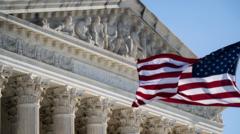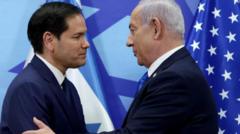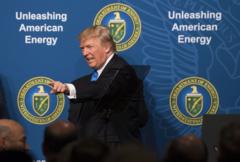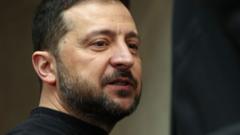In a bid to fulfill campaign promises during his second term, President Trump is facing multiple legal challenges over his sweeping executive actions. His administration’s ongoing defiance against judicial rulings raises concerns about the foundation of American governance and the balance of power among branches of government.
Trump Challenges Judicial Authority in Bold Executive Actions
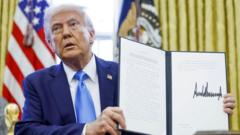
Trump Challenges Judicial Authority in Bold Executive Actions
President Trump's recent unilateral moves have ignited a fierce legal confrontation and potential constitutional crisis as he pushes the boundaries of executive power.
The first weeks of President Donald Trump's second term have marked a decisive shift in the execution of executive power as he has swiftly moved to enact a series of controversial policies. Among these measures are the suspension of new asylum claims, cancellation of refugee resettlement programs, a freeze on government hiring and spending, the decimation of several federal agencies, the barring of gender transition care for minors, and the proposition of a buyout for numerous federal employees.
These unilaterally initiated actions have not gone unnoticed, sparking a wave of legal challenges from Democrats, labor unions, and civil rights organizations. Courts have emerged as significant obstacles to Trump’s agenda, with judges halting several high-profile initiatives, including attempts to end automatic citizenship for children born on U.S. soil.
Despite facing pushback, Trump persists in his pursuit of these directives, suggesting that a legal clash with the judiciary is on the horizon. A Rhode Island judge recently criticized the administration’s blatant disregard for his court orders aimed at unfettering billions in federal expenditures. The White House's response has been to assert the legality of Trump's actions at every turn.
The judiciary's capacity to contest presidential authority is under increasing scrutiny, particularly as the Supreme Court may soon weigh in. With a conservative majority—including three justices appointed by Trump himself—the court's upcoming decisions could either fortify or curtail the expanded presidential powers that have been asserted.
Some legal analysts argue Trump's aggressive stance can yield political dividends, particularly if he is perceived as standing against judicial interference. His comments indicate a possible reluctance to recognize judicial authority entirely, suggesting a potential line of confrontation where he may opt to disregard court decisions altogether.
Statements from officials such as Vice President JD Vance reflect this sentiment, emphasizing a belief that judges should not encroach on executive power. However, such defiance would represent a stark deviation from U.S. historical norms and could ignite a constitutional crisis where the executive openly labels the judiciary as illegitimate.
Legal scholars express concern over Trump’s strategy, indicating that such conduct threatens to undermine the overall compliance and authority needed for effective governance across all branches. The rhetoric and actions derive a parallel to President Andrew Jackson’s historic challenge to the Supreme Court in the 1830s, echoing the clashes between the presidency and judiciary in a tumultuous political landscape.
As his efforts unfold, the implications of Trump’s intended actions could reshape his relationship with the courts and posit challenges for future presidencies, particularly regarding compliance with judicial rulings in a politically polarized environment. The ongoing legal battles signal a critical juncture in the complex interplay of power that defines American democracy.










